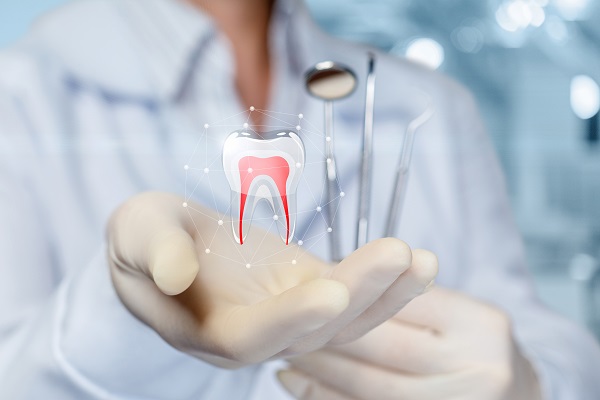Infected Tooth Relief From an Emergency Dentist

If you think you have a dental abscess, you should see an emergency dentist as soon as possible. An abscess is a dental infection that causes pus to collect in or around a tooth. Periodontal abscesses originate from the structures around the tooth, such as the jawbone or gums. Endodontic infections originate from inside the tooth itself when a crack or severe cavity allows bacteria inside. Immediate treatment can not only relieve pain but prevent dangerous complications arising from the infection. An untreated infection can spread to other areas of the body, where it can cause serious damage. If it spreads to the bloodstream, a life-threatening condition called septicemia could develop.
What are the symptoms of abscess and how does an emergency dentist diagnose it?
One of the most characteristic symptoms of an abscess is a visible pocket of swelling around the tooth. This resembles a small pimple and contains pus. Not all infections cause a visible abscess. The collection of pus puts pressure on the nerves of your tooth and can cause pain. This may radiate to your ear, face, jaw, or neck, or increase with biting or chewing. If the abscess ruptures, your pain may resolve immediately but your mouth fills with a fluid that tastes and smells foul. The underlying infection is still there, so the abscess may build up again. An abscess can cause sensitivity to hot or cold temperatures and make it difficult to swallow, breathe, or even open or close the mouth. An infection of a tooth can also cause systemic symptoms such as swollen lymph nodes and fever.
Based on these physical signs, an emergency dentist may be able to diagnose an abscess with a physical examination alone. However, if the infection is inside the tooth, it may require dental X-rays to diagnose.
How does an emergency dentist treat an infected tooth?
There are several possible treatments available for an infected tooth. Based on the specifics of your condition, you may receive more than one treatment.
Antibiotics
An abscess results from a bacterial infection. Antibiotics are medications that kill bacteria. A course of antibiotics may resolve the infection on its own. It is important to note that for antibiotics to work, the patient must follow the instructions for dosage and timing as carefully as possible. Missing a dose or not finishing the treatment because symptoms seem to be improving could result in the survival of the harmful bacteria. Symptoms would eventually reappear over time because the underlying cause was never eradicated.
Drainage
If the abscess is visible, the dentist may make a small incision in the gum tissue to allow the pus to drain from the wound after first using a local agent to numb the area. This should relieve pain, and then the dentist can wash out the wound with saline to flush out any remaining bacteria. The infection may have permanently destroyed some oral tissues, and the dentist may perform a procedure called debridement to remove it.
Root canal
If the infection is inside the tooth, a root canal may be performed to drain the abscess and remove the infected tissues, including the arteries, veins, and nerves. This is a method of preserving the tooth. While root canals have a reputation for being very painful, modern dentistry allows for a variety of methods to help patients feel as comfortable as possible. Many people report that the level of discomfort is no worse than having a cavity filled. Once the infected tissues are removed, the tooth is sealed and given a crown if necessary. Recovery is minimal and many people feel back to normal within a day or two.
Extraction
The tooth is only extracted if all other treatment options fail. Because it is very important to replace a lost, missing, or extracted tooth as soon as possible, your dentist will discuss your options for tooth replacement. These may include:
- A bridge
- A dental implant
- A partial denture
The treatment plan you and your dentist select will be based on the amount of dental work you are comfortable with, your aesthetic preferences, and the overall health and strength of the surrounding teeth. No matter which course of action you choose, replacing an extracted tooth helps prevent other complications from developing in the future.
Conclusion
See an emergency dentist if you think you may have an infected tooth with an abscess. This can prevent serious complications as well as relieve pain.
Request an appointment here: https://smilesdental.com or call Smiles Dental Care at (650) 563-1180 for an appointment in our Mountain View office.
Check out what others are saying about our dental services on Yelp: Emergency Dentist in Mountain View, CA.
Recent Posts
An emergency dentist is a particular type of dental professional who undergoes additional education and training to learn how to deal with urgent and emergency situations. While emergency dentists do learn how to provide general dentistry care, they also learn how to think and act on the spot when an emergency happens. In most cases,…
A cracked tooth may be a dental emergency if certain more severe symptoms develop. Although not every cracked tooth requires immediate attention, it is important to understand the more serious symptoms that indicate a cracked tooth is a dental emergency and requires prompt care.If your cracked tooth causes a high level of discomfort or increases…
Though they can be extremely painful, not every unexpected dental issue necessitates a visit to an emergency dentist. Whether you wake up in the middle of the night with tooth pain, or if you were in a sports accident that damaged a tooth, you may be wondering if you need immediate attention. Knowing when to…
If your gums are bleeding, you need to visit the emergency dentist for a dental examination. The dentist will check your oral cavity to learn if the bleeding is a result of minor irritation or a serious health issue. Most importantly, getting urgent care for gum bleeding can help prevent the situation from worsening. This…


